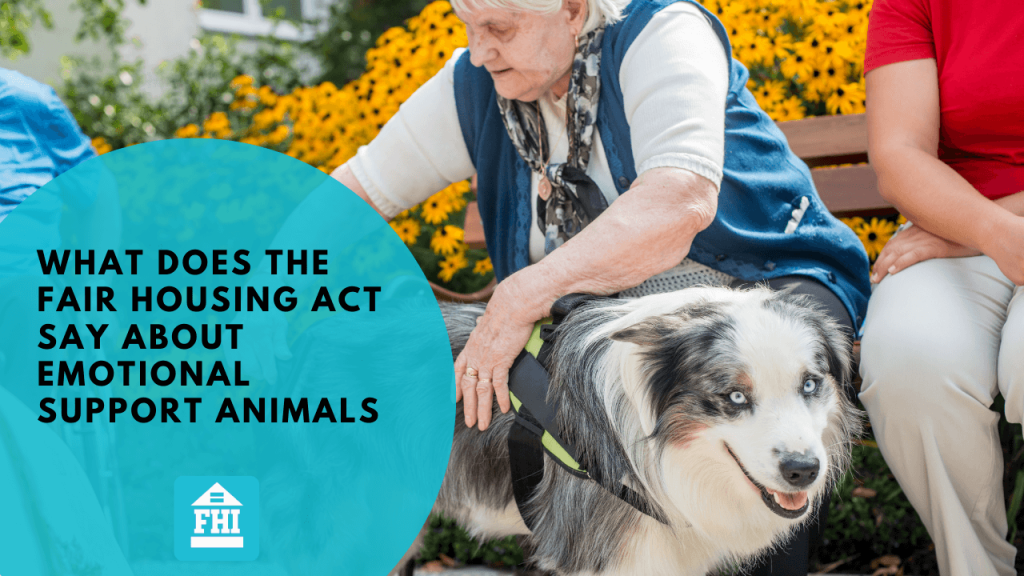
Emotional support animals are a hot topic. In property management, emotional support animals do relate to Fair Housing. Enjoy the episode below or the blog version. Find the answers to some common questions.
Be sure to check out our follow-up episode here: Your ESA Questions Answered
Table of contents
Here are the questions we will be discussing in this episode:
- What does the Fair Housing Act say about emotional support animals?
- Can housing deny an emotional support animal?
- Can a landlord deny an emotional support animal based on breed?
- What can a landlord require for an emotional support animal?
- Is an ESA an assistance animal?
- Are emotional support animals covered under the Fair Housing Act?
- Are landlords required to allow emotional support animals?
Highlights of Episode 15 – What Does The Fair Housing Act Say About Emotional Support Animals?
Are emotional support animals covered under the Fair Housing Act?
The short answer is, “Yes.” However, there are steps to be taken to verify anyone claiming this status for their pet. Having a process in place beforehand will help streamline the accommodation request. Let’s take a look at some common problems that the housing industry must overcome.
Can a landlord deny an ESA based on breed/size?
Imagine this scenario. Hi, meet my emotional support dog. Kujo the 100 pound Pit Bull. Oh boy! Many communities have breed/weight restrictions. But do these apply to ESAs? Before you even address the 100-pound dog in the room, start at the basics. Complete an application for housing. If the application is approved, now move on to processing a reasonable accommodation request. At this point, if the animal is verified as an emotional support animal, accommodations must be made, regardless of breed or size.
What can a landlord require for an ESA?
Next up is the undisclosed animal. You have just had a conversation with a tenant under the impression that an emotional support animal doesn’t need to be disclosed. What now? More than likely, you are also being presented with an ESA letter. Unfortunately, many of these are boilerplate letters from the Internet. Even though your first instinct might be to issue a lease violation, it is now your job to verify the letter. You can do this by asking the following questions.
You can ask the resident:
- Did you contact the verifier for the sole purpose of obtaining an ESA letter?
- Have you had more than one or two brief contacts with the verifier for the purpose of providing a verification?
- Does the verifier have personal knowledge of your disability and need for an animal?
- Has the verifier provided you with medical or mental health services?
You can ask the verifier:
- Did the resident contact you for the purpose of obtaining a verification?
- Other than providing a verification for an assistance animal, do you have an ongoing professional relationship with the resident by providing medical or mental health services beyond providing a verification?
- Do you have adequate personal knowledge of the resident to be able to make a diagnosis of a disability? Please note: we are not requesting that you provide the diagnosis.
As you can see from the above questions, the burden of proof lies in the relationship that the verifier has with the resident. If established, you must make accommodations. If not, then you are free to move forward with issuing a violation notice.
Can housing deny multiple emotional support animals?
As accommodations for emotional support, animals have become more commonplace, a new problem has surfaced. Residents are asking for more than one emotional support animal. Again, your first thought might be to say “No bluntly,” but this would not follow best practices. Instead, you need to follow the same protocol as you would for one pet, but with some additional steps. Additionally, the resident needs to explain what type of individual service each animal provides. Next, you would move on to the verifier. Review the verification letter to see whether it shows personal knowledge and an ongoing relationship with the resident. Next, verify if it explains the different services each pet provides. If the information doesn’t match or separate services haven’t been documented, it does not meet the criteria for adequate verification for multiple animals.
So as you can see, there are many different scenarios that you will contend with when it comes to ESAs. Having a reliable process in place that includes documentation and verification should ensure Fair Housing Compliance.
You May Also Like: Assistance Animals and the HUD Notice
We received so many questions regarding this episode that we decided to do a follow-up! Enjoy our this episode: Your ESA Questions Answered
